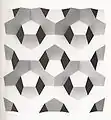Order-4 apeirogonal tiling
In geometry, the order-4 apeirogonal tiling is a regular tiling of the hyperbolic plane. It has Schläfli symbol of {∞,4}.
| Order-4 apeirogonal tiling | |
|---|---|
 Poincaré disk model of the hyperbolic plane | |
| Type | Hyperbolic regular tiling |
| Vertex configuration | ∞4 |
| Schläfli symbol | {∞,4} r{∞,∞} t(∞,∞,∞) t0,1,2,3(∞,∞,∞,∞) |
| Wythoff symbol | 4 | ∞ 2 2 | ∞ ∞ ∞ ∞ | ∞ |
| Coxeter diagram | |
| Symmetry group | [∞,4], (*∞42) [∞,∞], (*∞∞2) [(∞,∞,∞)], (*∞∞∞) (*∞∞∞∞) |
| Dual | Infinite-order square tiling |
| Properties | Vertex-transitive, edge-transitive, face-transitive edge-transitive |
Symmetry
This tiling represents the mirror lines of *2∞ symmetry. It dual to this tiling represents the fundamental domains of orbifold notation *∞∞∞∞ symmetry, a square domain with four ideal vertices.
Uniform colorings
Like the Euclidean square tiling there are 9 uniform colorings for this tiling, with 3 uniform colorings generated by triangle reflective domains. A fourth can be constructed from an infinite square symmetry (*∞∞∞∞) with 4 colors around a vertex. The checker board, r{∞,∞}, coloring defines the fundamental domains of [(∞,4,4)], (*∞44) symmetry, usually shown as black and white domains of reflective orientations.
| 1 color | 2 color | 3 and 2 colors | 4, 3 and 2 colors | |||
|---|---|---|---|---|---|---|
| [∞,4], (*∞42) | [∞,∞], (*∞∞2) | [(∞,∞,∞)], (*∞∞∞) | (*∞∞∞∞) | |||
| {∞,4} | r{∞,∞} = {∞,4}1⁄2 |
t0,2(∞,∞,∞) = r{∞,∞}1⁄2 |
t0,1,2,3(∞,∞,∞,∞) = r{∞,∞}1⁄4 = {∞,4}1⁄8 | |||
 (1111) |
 (1212) |
 (1213) |
 (1112) |
 (1234) |
 (1123) |
 (1122) |
Related polyhedra and tiling
This tiling is also topologically related as a part of sequence of regular polyhedra and tilings with four faces per vertex, starting with the octahedron, with Schläfli symbol {n,4}, and Coxeter diagram ![]()
![]()
![]()
![]()
![]() , with n progressing to infinity.
, with n progressing to infinity.
| *n42 symmetry mutation of regular tilings: {n,4} | |||||||
|---|---|---|---|---|---|---|---|
| Spherical | Euclidean | Hyperbolic tilings | |||||
 |
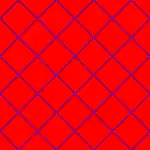 |
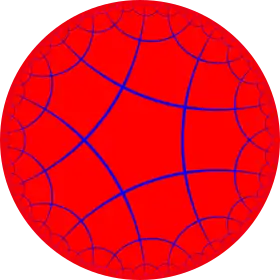 |
 |
 |
 |
 | |
| 24 | 34 | 44 | 54 | 64 | 74 | 84 | ...∞4 |
| Paracompact uniform tilings in [∞,4] family | |||||||
|---|---|---|---|---|---|---|---|
 |
 |
 |
 |
 |
 |
 | |
| {∞,4} | t{∞,4} | r{∞,4} | 2t{∞,4}=t{4,∞} | 2r{∞,4}={4,∞} | rr{∞,4} | tr{∞,4} | |
| Dual figures | |||||||
 |
 |
 |
 |
 |
 |
 | |
| V∞4 | V4.∞.∞ | V(4.∞)2 | V8.8.∞ | V4∞ | V43.∞ | V4.8.∞ | |
| Alternations | |||||||
| [1+,∞,4] (*44∞) |
[∞+,4] (∞*2) |
[∞,1+,4] (*2∞2∞) |
[∞,4+] (4*∞) |
[∞,4,1+] (*∞∞2) |
[(∞,4,2+)] (2*2∞) |
[∞,4]+ (∞42) | |
= |
= |
||||||
| h{∞,4} | s{∞,4} | hr{∞,4} | s{4,∞} | h{4,∞} | hrr{∞,4} | s{∞,4} | |
 |
 |
 |
 | ||||
| Alternation duals | |||||||
 |
 |
||||||
| V(∞.4)4 | V3.(3.∞)2 | V(4.∞.4)2 | V3.∞.(3.4)2 | V∞∞ | V∞.44 | V3.3.4.3.∞ | |
| Paracompact uniform tilings in [∞,∞] family | ||||||
|---|---|---|---|---|---|---|
= = |
= = |
= = |
= = |
= = |
= |
= |
 |
 |
 |
 |
 |
 |
 |
| {∞,∞} | t{∞,∞} | r{∞,∞} | 2t{∞,∞}=t{∞,∞} | 2r{∞,∞}={∞,∞} | rr{∞,∞} | tr{∞,∞} |
| Dual tilings | ||||||
 |
 |
 |
 |
 |
 |
 |
| V∞∞ | V∞.∞.∞ | V(∞.∞)2 | V∞.∞.∞ | V∞∞ | V4.∞.4.∞ | V4.4.∞ |
| Alternations | ||||||
| [1+,∞,∞] (*∞∞2) |
[∞+,∞] (∞*∞) |
[∞,1+,∞] (*∞∞∞∞) |
[∞,∞+] (∞*∞) |
[∞,∞,1+] (*∞∞2) |
[(∞,∞,2+)] (2*∞∞) |
[∞,∞]+ (2∞∞) |
 |
 |
 |
 |
 |
 | |
| h{∞,∞} | s{∞,∞} | hr{∞,∞} | s{∞,∞} | h2{∞,∞} | hrr{∞,∞} | sr{∞,∞} |
| Alternation duals | ||||||
 |
 |
 |
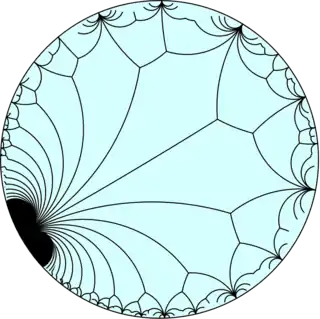 | |||
| V(∞.∞)∞ | V(3.∞)3 | V(∞.4)4 | V(3.∞)3 | V∞∞ | V(4.∞.4)2 | V3.3.∞.3.∞ |
| Paracompact uniform tilings in [(∞,∞,∞)] family | ||||||
|---|---|---|---|---|---|---|
 |
 |
 |
 |
 |
 |
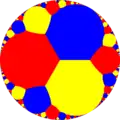 |
| (∞,∞,∞) h{∞,∞} |
r(∞,∞,∞) h2{∞,∞} |
(∞,∞,∞) h{∞,∞} |
r(∞,∞,∞) h2{∞,∞} |
(∞,∞,∞) h{∞,∞} |
r(∞,∞,∞) r{∞,∞} |
t(∞,∞,∞) t{∞,∞} |
| Dual tilings | ||||||
 |
 |
 |
 |
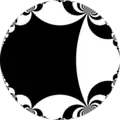 |
 |
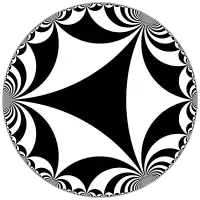 |
| V∞∞ | V∞.∞.∞.∞ | V∞∞ | V∞.∞.∞.∞ | V∞∞ | V∞.∞.∞.∞ | V∞.∞.∞ |
| Alternations | ||||||
| [(1+,∞,∞,∞)] (*∞∞∞∞) |
[∞+,∞,∞)] (∞*∞) |
[∞,1+,∞,∞)] (*∞∞∞∞) |
[∞,∞+,∞)] (∞*∞) |
[(∞,∞,∞,1+)] (*∞∞∞∞) |
[(∞,∞,∞+)] (∞*∞) |
[∞,∞,∞)]+ (∞∞∞) |
 |
 |
 |
 |
 |
 |
 |
| Alternation duals | ||||||
 |
 |
 |
 |
 |
 |
|
| V(∞.∞)∞ | V(∞.4)4 | V(∞.∞)∞ | V(∞.4)4 | V(∞.∞)∞ | V(∞.4)4 | V3.∞.3.∞.3.∞ |
See also
References
- John H. Conway, Heidi Burgiel, Chaim Goodman-Strass, The Symmetries of Things 2008, ISBN 978-1-56881-220-5 (Chapter 19, The Hyperbolic Archimedean Tessellations)
- "Chapter 10: Regular honeycombs in hyperbolic space". The Beauty of Geometry: Twelve Essays. Dover Publications. 1999. ISBN 0-486-40919-8. LCCN 99035678.

